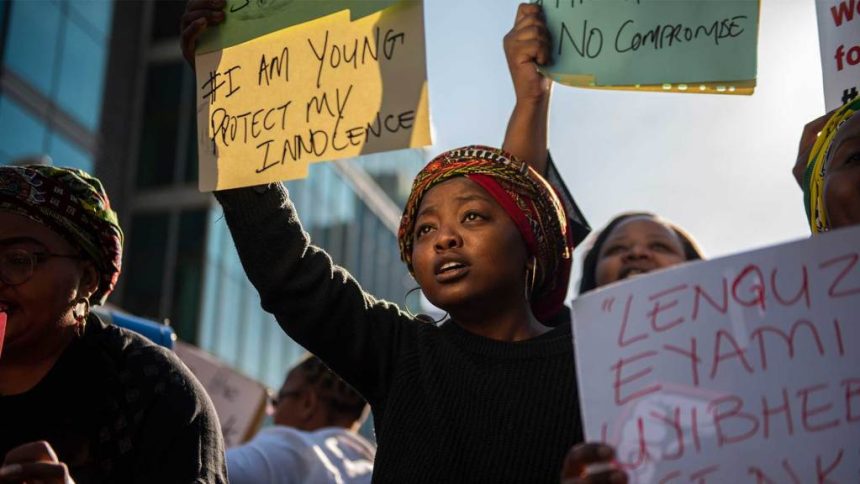The escalating wave of femicide in Kenya has ignited a collective urgency to confront and halt the alarming violence directed at women. Recent incidents, like the harrowing murder of a 20-year-old female student in Nairobi, have shaken communities, serving as painful reminders of the perilous reality many women face.
Despite the absence of official statistics, estimations paint a grim picture, suggesting that around 500 women have fallen victim to femicide between 2016 and 2014. Responding to the slow law enforcement responses, women across the country mobilized in late January, demonstrating with hashtags #endFemicideKE, #StopkillingUS, and #totalShutdownKE.
Of even greater concern is the distressing normalization and justification of such violence, particularly evident in certain segments of society. Shockingly, on social media and radio platforms, some individuals, predominantly men but also a few women, have been observed condoning these heinous acts. Their rationale often hinges on victim-blaming, citing perceived character flaws or occupations as reasons why the victims “deserved” their fate. Such sentiments underscore a deeply ingrained culture of misogyny and entitlement with disregard for women’s lives that cannot be tolerated.
A 2021 Twaweza survey in Makueni County revealed a disheartening statistic: 13% of women reported experiencing violence compared to just 2% of men. Even more troubling is the fact that 15% of the population in Makueni believes that women sometimes deserve to be subjected to violence.
While there are laws; policies and even a gender-designated desk in the Kenya Police Service to address gender-related violence including femicide, the implementation, and enforcement are still sluggish. The gaps and loopholes in the legal framework, enforcement bodies with limited access to support systems including shelters, counseling, and legal aid for the victims hampers the ability for victims to get assistance thus contributing to the persistence of the injustice.
While the president’s advisor Ms Harriet Chiggai, condemned the recent femicide incidents and assured that the government is committed to ending all kinds of violence against women, the suspects are still to be brought to book.
Addressing and halting the brutal normalization of violence against women requires a multifaceted approach that tackles the root causes and challenges societal norms
Addressing and halting the brutal normalization of violence against women requires a multifaceted approach that tackles the root causes and challenges societal norms, urgent action is imperative: To combat this brutal normalization of violence against women, Firstly, we must acknowledge that violence and the killing of women are harsh realities that many have been conditioned to accept as unavoidable. This narrative must be challenged and dismantled.
It’s crucial to recognize that femicide transcends all boundaries of class, education, race, culture, and borders. To begin, we should systematically collect data and stories, sharing them widely to shed light on the perpetrators and enablers of femicide and the broader societal impact. By confronting this issue head-on, we can begin to understand its complexities and work towards addressing the systems and structures that perpetuate this injustice.
Secondly, we need to delve into the root causes of femicide. This involves recognizing its complexity, intertwined with factors such as structural inequality, religious-cultural norms, and misogyny. Engaging in open conversations about how these factors contribute to violence against women can provide valuable insights and guide us toward multifaceted solutions.
However, understanding the root causes alone is insufficient. We must also challenge these norms by holding enablers and perpetrators accountable. This entails dismantling harmful stereotypes through education, strengthening our legal framework, and retraining law enforcement to respond effectively and provide support to victims. Creating an environment where there is zero tolerance for violence against women, regardless of the offender’s background, is essential to fostering a safer society.
Lastly, collective action is paramount. Ending the killing of women requires concerted efforts at personal, community, national, and international levels. While recent demonstrations and condemnations are steps in the right direction, we must remain consistent and determined in dismantling the structures that enable oppression and discrimination against women to persist.
By raising awareness, challenging societal norms, holding perpetrators and enablers accountable, and empowering women and girls, we can create a world where every woman can live free from the threat of femicide. It’s also crucial not to overlook the importance of sensitizing men and boys in this process, as their involvement is integral to achieving meaningful change.
Together, let us strive for a future where femicide is no longer a grim reality but a thing of the past. Standing up collectively to say “enough” is an important first step, for our goal is not perfection but progress, towards creating a safer and more just Kenya for all its citizens. Through collective action, this is achievable.



